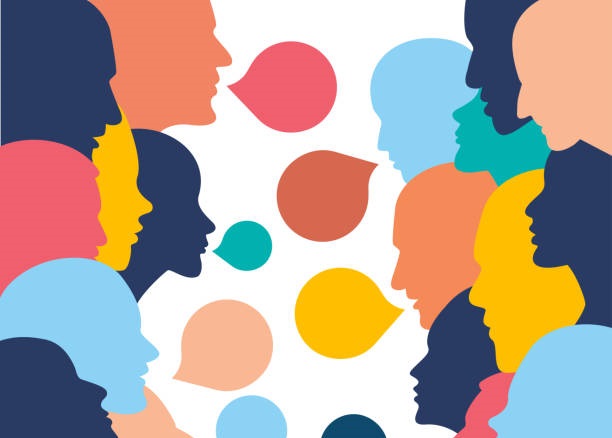Amanda Bitrus is an English teacher in the city of Abuja who puts a lot of her energy into her work. Each evening before work, she peruses her teaching materials, hones each lesson in the module so that her lecture is clear and refined.
For her meticulous approach, Bitrus was awarded the most confident and articulate educator in her school. Bitrus’ stellar reputation is largely thanks to her voice, which continues to grow in strength and resonance. Her sonic brilliance has equally become a lifelong mission for her—to empower students to find their voices and wield them with impact.
For ages, the voice has held much significance beyond its literal form, impacting various spheres of human life. April 16, World Voice Day, celebrates the remarkable phenomenon of the voice in communication, art, society, and many others. The day also amplifies awareness of voice issues, artistic training, rehabilitation, and research.
Nicholas Jonathan, a professional singer living in Abuja, regards his voice as his most cherished asset, paving the way for not only riches but also solace. When a severe cold cramps his vocal cords, Jonathan turns insecure.
For Chioma Njoku, a speech-pattern expert based in Lagos, her daily routine involves studying and analyzing the intricacies of people’s speech. Njoku helps those with speech impairments structure their conversations effectively. She believes in clear and precise communication, regardless of the medium of expression.
The annual celebration is aimed at encouraging the usage of the voice in pursuit of pleasure and business and supporting research in voice training and sustenance. The production of voice is studied in many different disciplines, from music and art to physics and medicine.
The idea to honor the voice was first proposed in 1999 by the Society of Laryngology & Voice in Brazil. In 2002, Professor Mario Andre, a Portuguese laryngologist and then president of the European Laryngological Society, suggested that people all over the world should celebrate World Voice Day.
The idea was later developed further and adopted in different nations. In 2012, voice researchers–such as Dr. Filipa from Portugal; Prof. Tecumseh Fitch from Austria; and Prof. Johan Sundberg from Sweden–formed a global group for the annual honor, inviting speech experts from across the world. The group currently has 66 members, who coordinate events around World Voice Day in their respective countries.
Driving impact, shaping narratives
Outside of its rich, sonic quality, the voice is a veritable weapon of change in a democracy. A prime example can be seen in the EndSARS protests of October 2020, which marked a significant epoch in history for young Nigerians. Its slogan Soro Soke—which roughly translates to speak up—was a battle cry against police brutality, government crackdowns and the numerous atrocities that sparked the country-wide, later worldwide, demonstrations. The hashtag #EndSARS accrued over 28 million tweets with solidarity protests by Nigerians breaking out in notable cities around the world.
In the same vein, the Aba Women’s Riot of 1929 also stands as a powerful testament to the transformative potential of the voice in society. Angered by the colonial policies of the British overlords regarding taxation and land rights, thousands of Igbo women from various socio-economic backgrounds united in protest. Led by figures such as Nwanyereuwa (also known as “Nwanyeruwa the Great”), the women employed a variety of vocal tactics, including chants, songs, and ululations, to register their grievances and create a change. Their collective outcry pulsated across the region, forcing mass movements that transcended ethnic and class divisions.
Nigeria’s independence from the British represents perhaps the most prominent illustration of the voice in social activism. Individuals and groups used their voices to press for liberation and assert Nigeria’s sovereignty.
Among these eminent voices in the struggle for independence were those of nationalist leaders such as Nnamdi Azikiwe, Obafemi Awolowo, and Ahmadu Bello. Through their speeches, writings, and political activism, these leaders galvanized support for the vision of a united, independent Nigeria free from British rule. Their advocacy helped build a sense of national identity among Nigerians across ethnic and regional divides.
In the 1960s, the press and media were shaping public opinion and fostering a sense of national consciousness. Nigerian newspapers and radio broadcasts served as platforms for dissent and debate, magnifying the voices of independent activists and disseminating anti-colonial messages to a wider audience. Journalists and editors played a crucial role in exposing colonial injustices, advocating for political reform, and challenging the legitimacy of British rule.
The media became a bridge between the government and the citizenry by amplifying the voices of marginal groups and communities.
Such is the vision Bitrus, the English teacher, articulates to her students each day. In a rich, sonorous voice, she guides them through the limitless possibilities of the speech organ, highlighting the wide-ranging impact of a chorus of voices.
Amanda Bitrus, an English teacher in Abuja, is celebrated for her meticulous and engaging teaching style. She was awarded for her confidence and articulation, driven by her mission to empower students to use their voices effectively.
April 16 marks World Voice Day, which highlights the significance of the voice in communication, art, and society. It underscores voice-related issues and encourages artistic training, rehabilitation, and research. The celebration began in 1999 by the Brazilian Society of Laryngology & Voice and expanded globally in 2002.
Nicholas Jonathan, a singer in Abuja, and Chioma Njoku, a speech-pattern expert in Lagos, exemplify the personal and professional importance of the voice. Jonathan's voice is his pride and source of solace, while Njoku focuses on clear and effective communication for those with speech impairments.
The voice has been central to social activism in Nigeria. The EndSARS protests of 2020 used the slogan "Soro Soke" to rally against police brutality and government oppression. Similarly, the 1929 Aba Women's Riot united Igbo women against British colonial policies through vocal protests. Nigeria's independence movement was driven by the voices of leaders like Nnamdi Azikiwe, Obafemi Awolowo, and Ahmadu Bello, and amplified by the press and media in the 1960s.
Bitrus embodies this vision daily, teaching her students the powerful impact of their voices in society.






